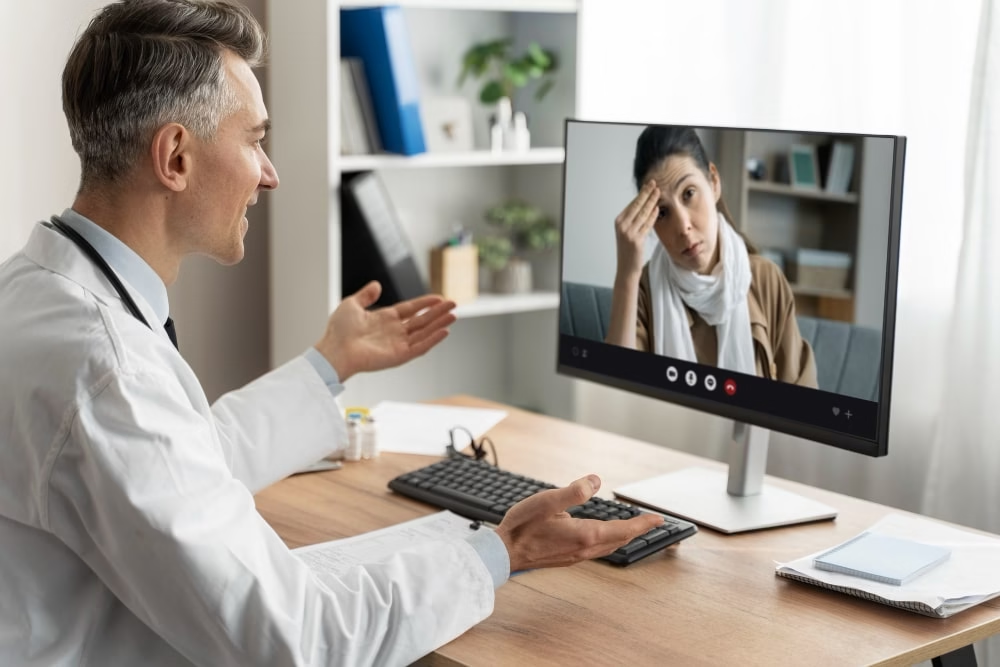In today’s fast-paced world, access to mental health care is more important than ever. With stress levels on the rise and mental health concerns becoming more prevalent, many people seek therapy to navigate life’s challenges. However, for some, traditional in-person therapy isn’t always a feasible option. Whether due to geographical limitations, mobility issues, or packed schedules, the barriers to seeking help can be significant.
Enter virtual mental health treatment—a modern, flexible, and increasingly popular approach to therapy. But the question remains: Can virtual sessions be just as effective as face-to-face therapy? The answer is a resounding yes. Thanks to advances in technology and the growing expertise of telehealth mental health providers, online therapy has proven to be a powerful tool in supporting mental well-being.
The Rise of Virtual Mental Health Treatment
Virtual therapy, also known as teletherapy or online counseling, has gained momentum in recent years, and the COVID-19 pandemic further accelerated its adoption. While some initially questioned its effectiveness, research and real-world experience have demonstrated that virtual therapy can be just as beneficial as traditional, in-person sessions.
One of the key reasons for its success is accessibility. Telehealth mental health providers can now reach individuals who may have previously struggled to access care. Whether someone lives in a rural area without nearby therapists, has a demanding job that prevents them from making regular appointments, or experiences social anxiety that makes in-person visits overwhelming, virtual therapy offers a solution.
How Virtual Therapy Matches In-Person Sessions in Effectiveness
Skeptics may wonder whether a screen can truly replace face-to-face interaction in therapy. However, studies indicate that online therapy is just as effective as in-person treatment for a wide range of mental health conditions, including depression, anxiety, PTSD, and stress-related disorders. Here’s why:
Strong Therapeutic Relationships Can Be Built Online
A common misconception is that virtual therapy lacks the personal connection found in traditional sessions. However, research suggests that telehealth mental health providers are fully capable of forming deep, meaningful therapeutic relationships through video calls, phone sessions, and even text-based therapy.
Many clients find that virtual therapy feels just as intimate and engaging as in-person therapy, particularly when sessions are conducted via video calls. The key factors in therapy’s success—trust, empathy, and effective communication—remain intact, regardless of the medium.
Convenience and Consistency Improve Outcomes
One of the biggest hurdles in mental health treatment is consistency. Missed appointments due to work conflicts, transportation issues, or personal responsibilities can disrupt progress. Virtual therapy eliminates many of these barriers, allowing individuals to schedule sessions more easily and attend regularly.
Since therapy is most effective when done consistently, the convenience of virtual sessions contributes to better long-term outcomes. Patients are more likely to stay committed to their treatment plans when they don’t have to worry about commuting or fitting appointments into a hectic schedule.
Increased Comfort Leads to Openness
Many people feel more comfortable discussing personal matters from the safety of their own homes. This sense of security can help clients open up more freely during sessions, leading to deeper conversations and more productive therapy.
For individuals who experience social anxiety or past trauma, the ability to engage with a therapist from a familiar and safe environment can be a game-changer. Telehealth mental health providers often report that clients are more at ease and willing to engage in difficult discussions when they don’t have the added stress of navigating an unfamiliar clinical setting.
Expanded Access to Specialized Care
Not all communities have a wide range of therapists available, especially those who specialize in specific conditions or treatment modalities. Virtual therapy allows individuals to connect with specialists across the country (or even the world), ensuring they receive care tailored to their unique needs.
For example, someone seeking a therapist trained in trauma-informed care, LGBTQ+ affirming therapy, or cognitive-behavioral therapy (CBT) for OCD may have limited options locally. Through virtual therapy, they can work with the right expert without geographical constraints.
Effective Use of Technology Enhances the Experience
Modern therapy isn’t limited to just video calls. Many telehealth mental health providers incorporate digital tools to enhance treatment, including:
- Secure messaging platforms for ongoing support between sessions.
- Digital mood tracking apps that help clients and therapists monitor progress.
- Online worksheets and exercises tailored to specific therapeutic techniques.
These resources allow for greater engagement and support between sessions, reinforcing therapeutic progress in ways that traditional in-person therapy might not.
Addressing Concerns About Virtual Therapy
While virtual mental health treatment has numerous benefits, it’s important to acknowledge some common concerns:
- Privacy and Confidentiality – Some individuals worry about discussing sensitive topics at home, especially if they live with others. However, therapists can provide strategies to create a private, safe space, and reputable telehealth mental health providers use encrypted platforms to ensure confidentiality.
- Technology Barriers – Not everyone is comfortable with digital tools, but most platforms are designed to be user-friendly. Additionally, phone sessions are often available for those who struggle with video calls.
- Crisis Situations – Virtual therapy is not always ideal for severe psychiatric crises. However, many telehealth mental health providers work in tandem with emergency services to ensure clients receive the appropriate care if needed.
Who Can Benefit Most from Virtual Mental Health Treatment?
While virtual therapy is beneficial for a wide range of individuals, it may be particularly helpful for:
- Busy professionals and parents who struggle to find time for in-person sessions.
- Individuals with physical disabilities or mobility challenges who find it difficult to travel.
- People living in rural or underserved areas where local mental health resources are limited.
- Those experiencing anxiety or agoraphobia, making in-person sessions overwhelming.
- Clients seeking a specific type of therapist that may not be available in their area.
For these individuals, virtual therapy isn’t just an alternative—it’s often the best and most effective option.
The Future of Mental Health Care Is Virtual
As technology continues to evolve, virtual mental health treatment will only become more sophisticated and accessible. The stigma around online therapy is fading, and more individuals are recognizing its value. Telehealth mental health providers are leading the charge, using innovative methods to deliver care that is just as effective as traditional therapy—if not more so in some cases.
By breaking down barriers to mental health treatment, virtual therapy is empowering individuals to prioritize their well-being in ways that fit their lifestyles. The convenience, accessibility, and effectiveness of online therapy prove that healing and growth don’t always require a physical office—sometimes, all it takes is a strong connection, both emotionally and digitally.
So, can virtual mental health treatment be as effective as in-person sessions? The answer is clear: Yes, and for many, it may even be the preferred choice.




